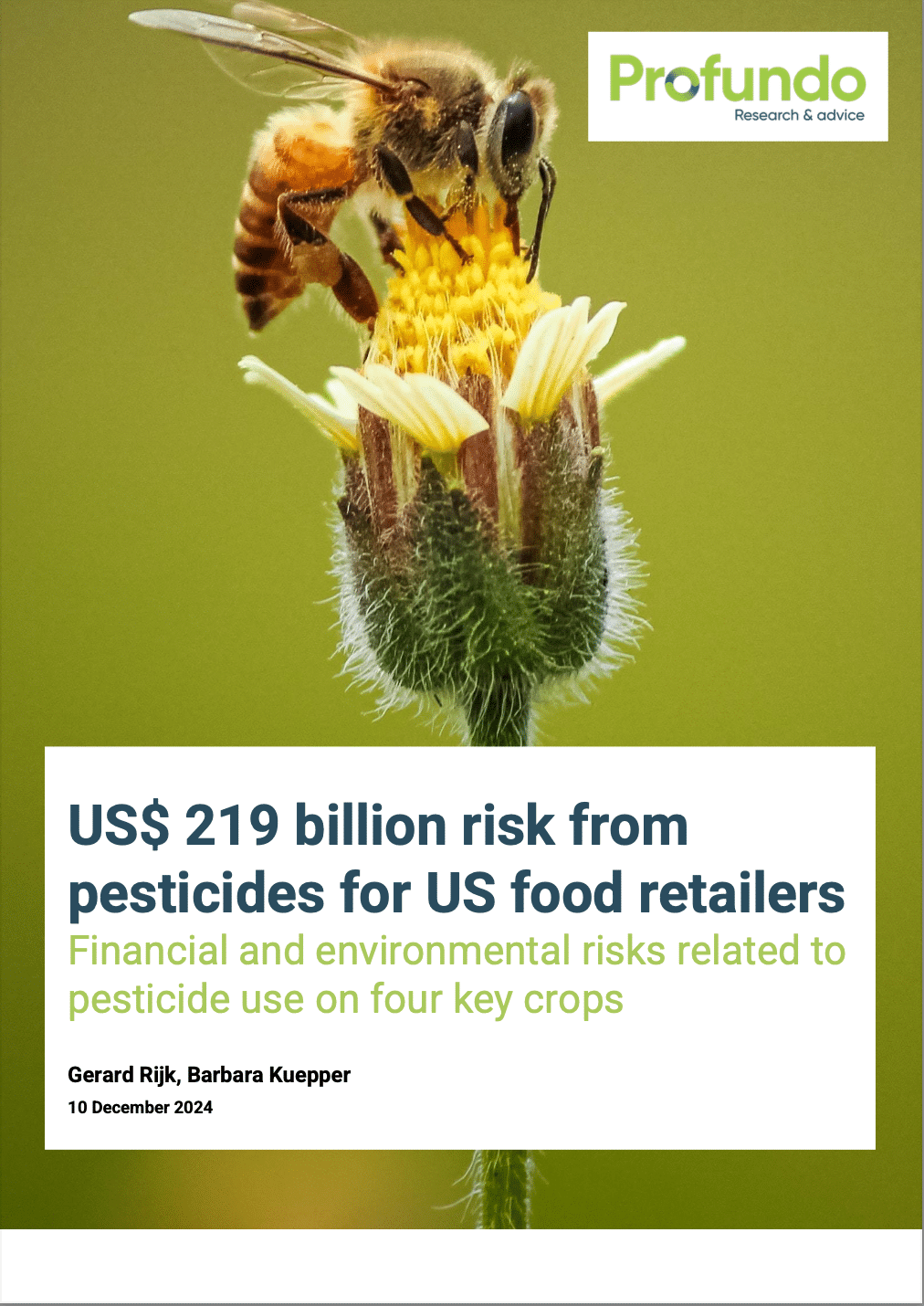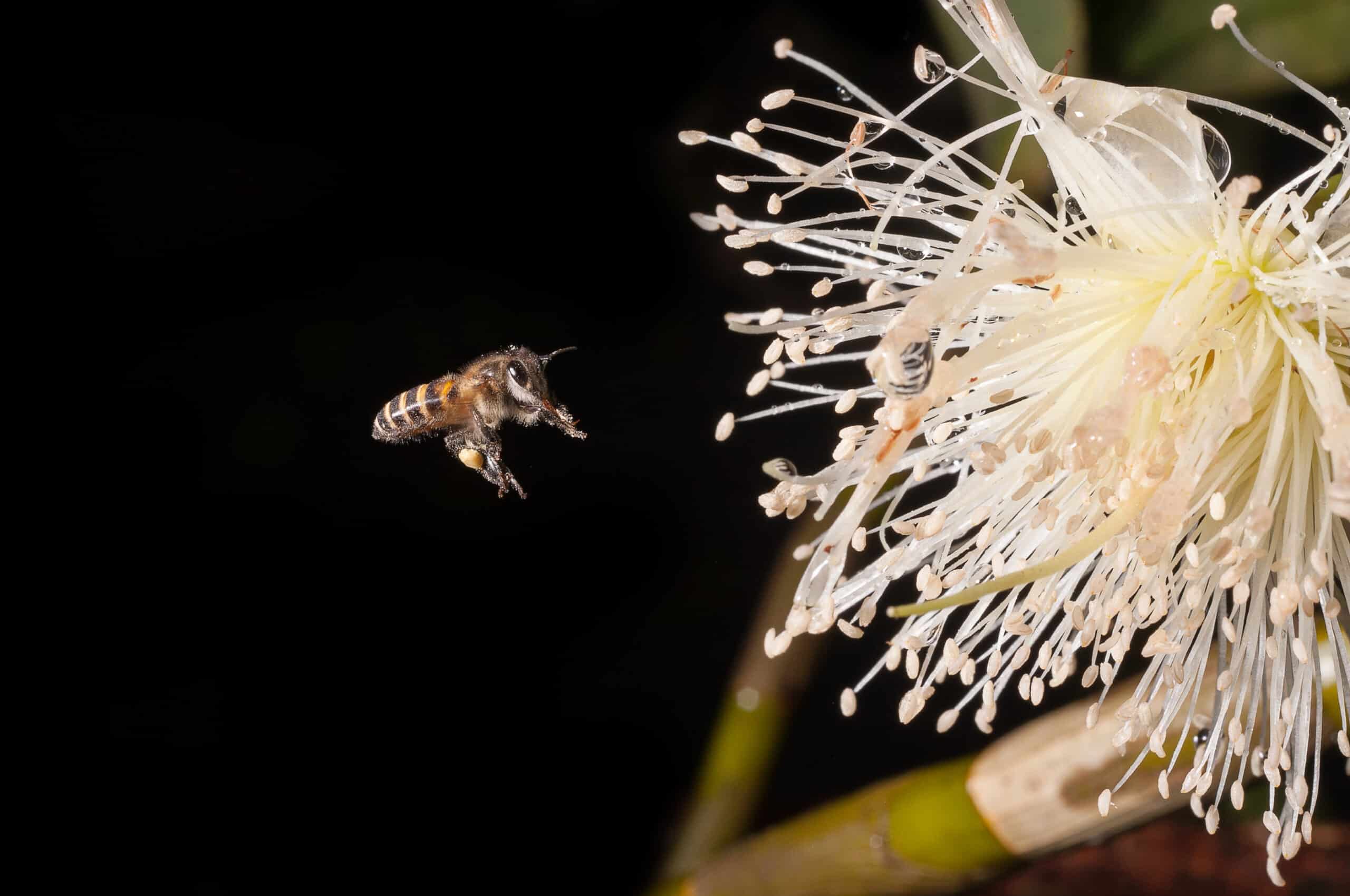Economic Risks of Pesticides

The U.S. food retail sector’s use of pesticides on just four crops could result in $219 billion in financial risks between now and 2050. The estimated costs include $4.5 billion in climate damage from the CO2-equivalent emissions associated with the production and use of pesticides and $34 billion in biodiversity risks associated with pollinator-harming pesticides in this report commissioned by Friends of the Earth and carried out by Netherlands-based research group Profundo.
Read the full report
Read the executive summary
Read the press release
The food sector is among the most vulnerable to the converging crises of biodiversity loss and climate change, and it is also a major contributor. Pesticides — a term that encompasses insecticides, herbicides, and fungicides — used in food retailer supply chains contribute directly to both crises. They are responsible for widespread harm to biodiversity, including pollinators, which are required to maintain a third of the food supply, and soil organisms, which are central to building healthy soil, sequestering carbon, conserving water, and improving farmers’ climate resilience. What’s more, pesticides are fossil fuels, the production and use of which are significant drivers of agriculture-related greenhouse gas emissions. Pesticides also pose devastating risks to human health along the supply chain, from consumers to the farmers, farmworkers, and rural communities that are on the frontlines of exposure.
The report analyzes the risks associated with continued pesticide use through 2050 on four crops that are embedded in products that generate an estimated 55% of U.S. food retailers’ sales: corn, soy, apples, and almonds. Apples and almonds are among the top crops sold directly to consumers. Corn and soy are the top crops processed into packaged foods and livestock feed for meat, dairy, and eggs.
By assessing potential losses in operations, financing, and reputation as well as external harms to the climate and biodiversity, Profundo found that a value equal to nearly one-third (32%) of U.S. food retailers’ current equity — the total value of stock available to shareholders — would be lost if food retailers were held fully accountable for the risks.
Market leadership on pesticides is critical considering the failure of the U.S. government to adequately regulate the environmental and health risks of industrial agriculture overall and of pesticides in particular. The U.S. Environmental Protection Agency (EPA), under the influence of the pesticide industry, has regularly failed to follow the best available science and protect people and the environment from toxic pesticides. U.S. agriculture uses more than 1.1 billion pounds of pesticides annually, representing approximately 15% of total global pesticide usage. The EPA allows the use of 85 pesticides banned in other countries and continues to approve new pesticide products classified as highly hazardous.
The findings of this report signal the magnitude of harm associated with pesticide use, but they are a profound underestimate. It is impossible to assess the true scope of the harm wrought by toxic pesticides in our food system. This is partly due to the complex nature of the issue but also due to the inherent limitations of trying to express the intrinsic value of a stable climate, biodiversity, and human life and health purely in terms of economic value.
Food Retailer Action
Friends of the Earth’s Bee-Friendly Retailer Scorecard shows that major U.S. food retailers are increasingly acknowledging the role pesticides play in biodiversity loss. Since 2018, over half of the retailers ranked on the scorecard have established policies aimed at reducing toxic pesticides in their supply chains. Yet, despite this promising industry trend, efforts fall far short of what is needed to address the continued widespread use of toxic pesticides.
We are calling on food retailers to:
- Support the expansion of organic farming in the U.S. and beyond as a leading form of regenerative agriculture which achieves soil health and biodiversity protection without the use of over 900 pesticides otherwise allowed in agriculture;
- Support non-organic growers to eliminate toxic pesticides by adopting robust Integrated Pest Management and other ecological practices that reduce the need for pesticides; and
- Make the reduction of pesticides and other agrochemicals a central pillar of all regenerative and climate-smart agriculture initiatives.

Bee-Friendly Retailer Scorecard
We ranked major U.S. food retailers on protecting bees and biodiversity from toxic pesticides
Ways to Support Our Work

Read Latest News
Stay informed and inspired. Read our latest press releases to see how we’re making a difference for the planet.

See Our Impact
See the real wins your support made possible. Read about the campaign wins we’ve fought for and won together.

Donate Today
Help power change. It takes support from environmental champions like you to build a more healthy and just world.